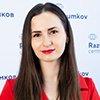The IMF reported that the outlook for the global economy had worsened significantly, and it could face the biggest challenge since World War II. The first signs of imminent trouble are already obvious: commodity markets are in a state of fever. Anticipating a global recession, oil prices fell by more than 10%, to $100/barrel – the lowest since early May. Citi analysts predict that by the year end, the price of "black gold" may drop to $65/barrel against the background of falling demand. The price of iron ore also fell by more than 10%. Goldman Sachs investment bank expects a further decrease in the cost of this raw material in the third quarter, to $90/t. How likely is the scenario of a global recession or a decrease in economic activity in specific countries? And how can it affect our GDP and the economy of the aggressor country, in particular, its ability to continue the war? We discussed it with Kateryna Markevych, a leading expert on economic and social programmes of Razumkov Center.
So, how can the global recession affect the Ukrainian economy?
— According to surveys performed by the Institute of Economic Research and Political Consultations, only 12% of the surveyed enterprises worked at full capacity in June. Despite the international financial assistance, our gold and foreign currency reserves have decreased by $8.2 billion, to $22.8 billion, over the past 6 months. Inflation, emissions, falling exports, slowdown of business processes, and reduction of international reserves have a negative impact on the Ukrainian economy. Ukraine’s GDP is expected to fall by some 45% in 2022. Our economy is already in an extremely difficult situation because of the war. The high rate of inflation, which is currently estimated at 20% and may accelerate to 25-30% by the end of the year, expands the category of socially vulnerable segments of the population. The purchasing capacity of the population has fallen: the share of households with incomes below the current subsistence level, making UAH 2,481 for able-bodied persons in 2022, may reach 70%, compared to 18% in 2021.
And what about the Russian economy? Will the revenues of the Russian Federation it may spend them on the war fall?
— The Russian economy is already suffering, and the situation will worsen, given the sanctions and the slowdown of the economies with which Russia continues to maintain economic relations. According to The Economist, due to sanctions, exports to the key Western partners fell by 44%. At the same time, imports almost halved. Hundreds of companies have left the Russian market or continue to wind down their activities. All this affects tax revenues of the state budget. According to the World Bank forecasts, Russia's GDP is expected to fall by 12.4% in 2022, but the situation may change as the war goes on, the isolation of the Russian economy continues, and the risks of a global recession increase. That is, Russia is entering the worst recession in the last thirty years. Stocks of imported components are depleted, more and more companies cease to pay wages, unemployment is on the rise. Household incomes are decreasing, adjusted for inflation, which fluctuates within 16%. The "strong" rouble flaunted by the Russian government is a side effect of the blow to the Russian economy. Everything shows that Russia will become an economic appendage of China.
It is commonly suggested that major problems in the world economy arose primarily because of the invasion of Putin's army into Ukraine. Is it true?
— Yes. Russia's full-scale invasion caused a chain reaction that hit the world economy and is one of the main causes of the global recession predicted by international organisations and agencies. Disrupted trade links, transit routes, especially for sea container and air freight, rocketing energy prices and insurance premiums increased the cost of shipping. If food prices remain high, a significant number of people in African and Southeast Asian countries may find themselves in extreme poverty. Ukraine is also a huge risk zone.




